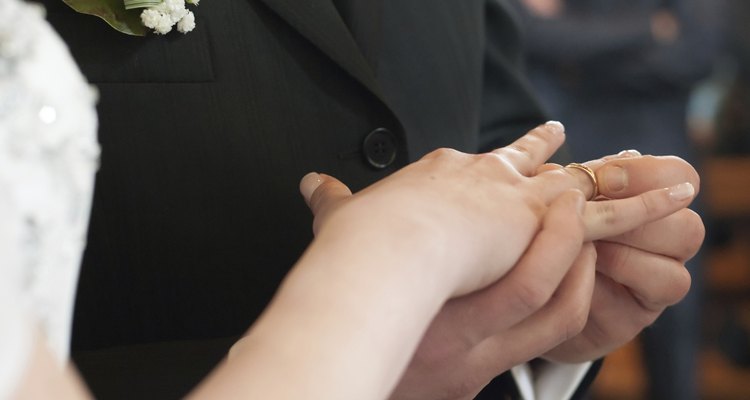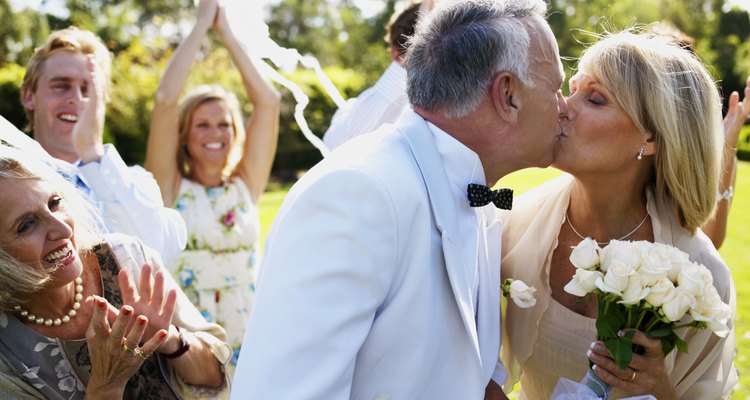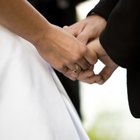
Justice of the Peace weddings are sometimes referred to as civil wedding ceremonies because they are not conducted in a church, synagogue or other religious venue. Couples who choose these types of weddings may want the flexibility of reading their own vows rather than ones proscribed by a religion, or they may want a quick and affordable ceremony.
Traditional Vows
Though civil ceremonies often eschew the trappings of a traditional wedding, some couples choose to recite traditional vows in which the bride and groom pledge allegiance to each other no matter what circumstances may come. A version of this vow may sound something like, "I, Jack Smith, in the presence of these witnesses, do take you, Jill, to be my lawful wedded wife to have and to hold, from this day forward, for better, for worse, for richer, for poorer, in sickness and in health, to love and to cherish, till death do us part."
Contemporary Vows

Fuse/Fuse/Getty Images
Some couples who wed in a civil ceremony create their own special vows, which can be recited in the form of a poem or written in any style that conveys the love and affection the couple has for each other. An example of this kind of vow is, "On this wonderful day, I feel so blessed to take you, Jill, as my wife, to honor you with my loyalty and friendship and to gratefully receive the joy of knowing you and I are now one entity, committed to one purpose, supporting and loving each other through light and darkness."
Official Pronouncement

eli77/iStock/Getty Images
During the exchange of rings, the Justice of the Peace will often ask the couple to join hands and then ask them if they want to marry each other. He then makes a statement that officially unites the bride and groom. This is very similar to the way a priest or pastor proclaims his authority to sanctify a religious marriage. The Justice of the Peace might say something along the lines of, "By joining hands, you are consenting to be bound together as husband and wife. You are promising to honor, love and support each other for the rest of your lives. By the authority vested in me by the laws of the state of California, I now pronounce you husband and wife."
Closing Remarks

Marc Debnam/Digital Vision/Getty Images
At the conclusion of the ceremony the Justice of the Peace often says a few closing words wishing the new couple luck in their marriage. He then officially introduces them to the world. The Justice of the Peace may use words such as, "You are now joined to each other by love and respect, two qualities you must always remember, even when times are difficult. I wish you the best of luck in your marriage, and it is my honor to introduce Mr. and Mrs. John Smith."
Related Articles

The Wording for a Simple Wedding ...

Traditional Wedding Prayers and ...

Mandatory Legal Phrases for Wedding Vows

Wedding Prayers of the Faithful

Specialized Prayers That Mother's Pray ...

What Is the Benediction in a Wedding ...

Wedding Prayers & Toasts

How to Plan a Single Ring Wedding ...

How to Officiate a Wedding Renewal

Traditional Mexican Wedding Vows

How to Write a Commitment Ceremony

How to Get Certified to Marry Couples

Mexican Catholic Wedding Traditions

Ribbon Meanings for a Handfasting ...

What Actions Can I Do to Rebuild Trust ...

Order of Events for a Non-Religious ...

Mother of the Bride Wedding Speech Ideas

Prayers for Mothers Who Have Lost Their ...

How to Get Ordained to Officiate a ...

What Does It Mean to Touch Souls?
References
Writer Bio
Sampson Quain is a screenwriter and filmmaker who began writing in 1996. He has sold feature and television scripts to a variety of studios and networks including Columbia, HBO, NBC, Paramount and Lionsgate. He holds a Master of Fine Arts in screenwriting from the University of Southern California.
Photo Credits
Jupiterimages/Polka Dot/Getty Images